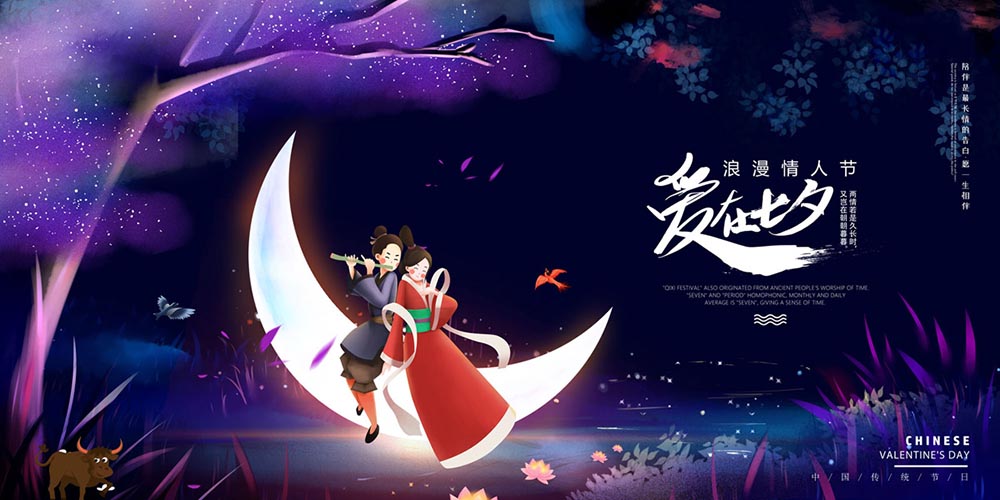七夕的由来英文介绍及《鹊桥仙》英文翻译
本文内容导读目录
Double Seventh Festival
七夕节
The Double Seventh Festival, on the 7th day of the 7th lunar month, is a traditional festival full of romance. It often goes into August in the Gregorian calendar
农历七月初七的七夕节是一个充满浪漫气息的传统节日,通常七夕节是在阳历的8月份。
This festival is in mid-summer when the weather is warm and the grass and trees reveal their luxurious greens. At night when the sky is dotted with stars, and people can see the Milky Way spanning from the north to the south. On each bank of it is a bright star, which sees each other from afar. They are the Cowherd and Weaver Maid, and about them there is a beautiful love story passed down from generation to generation.
这个节日是在仲夏的时候,天气温暖,草木露出了他们的翠绿的色泽。 在繁星点缀的夜晚,人们可以看到银河从北向南延伸。在银河两岸都各有一颗璀璨的星辰,它们彼此遥遥相望。他们就是牛郎星和织女星,关于他们美丽的爱情故事代代相传。
Long, long ago, there was an honest and kind-hearted fellow named Niu Lang (Cowhand). His parents died when he was a child. Later he was driven out of his home by his sister-in-law. So he lived by himself herding cattle and farming. One day, a fairy from heaven Zhi Nu (Weaver Maid) fell in love with him and came down secretly to earth and married him. The cowhand farmed in the field and the Weaver Maid wove at home. They lived a happy life and gave birth to a boy and a girl. Unfortunately, the God of Heaven soon found out the fact and ordered the Queen Mother of the Western Heavens to bring the Weaver Maid back.
在很久很久以前,有一个诚实而善良的人叫牛郎。他的父母在他小时候就去世了,不久后他就被嫂子赶出了家门。因此,他独自一人生活以放牛和耕种为生。有一天,一位来自天上的仙女织女爱上了他,并偷偷地下凡来到人间和他在一起。牛郎在田间耕种,而织女则在家织布,他们过着幸福的生活,并有了一对儿女。然而不幸的是,玉皇大帝很快就发现了织女下凡的事,并命令西王母把织女带回来。
With the help of celestial cattle, the Cowhand flew to heaven with his son and daughter. At the time when he was about to catch up with his wife, the Queen Mother took off one of her gold hairpins and made a stroke. One billowy river appeared in front of the Cowhand. The Cowhand and Weaver Maid were separated on the two banks forever and could only feel their tears. Their loyalty to love touched magpies, so tens of thousands of magpies came to build a bridge for the Cowhand and Weaver Maid to meet each other. The Queen Mother was eventually moved and allowed them to meet each year on the 7th of the 7th lunar month. Hence their meeting date has been called “Qi Xi”.
牛朗带着儿女在神牛的帮助下飞往天庭。在他即将追上妻子的时候,王母摘下了她头上的一根金叉,轻轻一划。一条滚滚的天河就出现在牛郎面前。而牛郎和织女则被永远分隔在天河两岸,只能默默看着彼此流泪。他们忠贞的爱情感动了喜鹊,因此为了让牛郎和织女能够相见,成千上万的喜鹊飞来为他们搭建了一座鹊桥。 王母最终也被他们的爱情感动,并允许他们在每年农历七月初七相见。因此,他们相见之期被称为“七夕”。
Scholars have shown the Double Seventh Festival originated from the Han Dynasty (206 BC-AD220). Historical documents from the Eastern Jin Dynasty (AD371-420) mention the festival, while records from the Tang Dynasty (618-907) depict the grand evening banquet of Emperor Taizong and his concubines. By the Song (960-1279) and Yuan (1279-1368) dynasties, special articles for the “Qi Xi” were seen being sold on markets in the capital. The bustling markets demonstrated the significance of the festival.
学者们已经证明了七夕节起源于汉朝(公元前206年至公元220年)。 东晋(AD371-420)的历史文献提到了这一节日,而唐朝(618-907)的记录则描绘了七夕节日时太宗皇帝及其皇妃的盛大晚宴。 到宋(960-1279)和元(1279-1368)朝时期,都城的市场上开始出售“七夕”相关的物品。繁荣的市场证明了七夕节日的重要性。
Today some traditional customs are still observed in rural areas of China, but have been weakened or diluted in urban cities. However, the legend of the Cowhand and Weaver Maid has taken root in the hearts of the people. In recent years, in particular, urban youths have celebrated it as Valentine’s Day in China. As a result, owners of flower shops, bars and stores are full of joy as they sell more commodities for love.
今天,在中国偏远地区,一些传统习俗仍然保留,但在城市中这些习俗却在逐渐淡化。然而,关于牛郎织女的传说却已根植在人们心中。特别是近年来,城市年轻男女将其视为中国的情人节来庆祝。因此,七夕时,花店,酒吧和商店的老板们就会非常高兴,因为他们可以卖出更多商品。
The fairy tale of the Cowherd and the Weaving Girl is one of the four most famous folktales of ancient China. It is a classic love story between a fairy and a human being and has a widespread influence. The Qixi Festival is said to have something to do with the fairy tale. Naturally, the seventh day of every seventh month of the lunar calendar has become Chinese Valentine’s Day.
《牛郎织女》的童话故事是中国古代四大著名民间故事之一。这是经典的仙女与凡人间的爱情故事,其影响广泛。据说七夕节与这个童话有关。自然,农历的每年七月初七便成为了中国的情人节。
The fairy tale of the Cowherd and the Weaving Girl has made the Qixi Festival the most romantic traditional Chinese festival. Countless poems in Chinese history are in praise of the story, the most famous works being the Fairy of the Magpie Bridge by the great ci writer Qin Guan of the Song Dynasty. In addition, traditional Chinese operas like Beijing Opera and Shaanxi opera etc have plays about the Cowherd and the Weaving Girl.
牛郎织女的童话故事使七夕节成为最浪漫的传统节日。中国历史上有无数的诗人赞美这个故事,最著名的作品为宋代词人秦观所作的《鹊桥仙》。 此外,中国传统戏曲如京剧,陕西戏曲等都有关于牛郎和织女的戏剧。
Modern Interpretations:
现代对七夕的解读:
Many Chinese view it as another chance to buy gifts for their sweethearts, and the holiday is repeated again on February 14, where Valentine’s culture appears to have permeated the earth. Thanks to Dr. Kylie Hsu from Cal State Los Angeles, here is a translation of that poem Fairy of the Magpie Bridge
现在许多中国人把七夕看做为他们心爱之人购买礼物的又一次机会,而在2月14日同样如此,情人节文化似乎已渗透到了地球的每个地方。感谢洛杉矶加州州立大学的Kylie Hsu博士对《鹊桥仙》的翻译,以下为翻译内容。
Fairy Of The Magpie Bridge
—–Translated by Dr. Kylie Hsu
Among the beautiful clouds,
Over the heavenly river,
Crosses the weaving maiden.
A night of rendezvous,
Across the autumn sky.
Surpasses joy on earth.
Moments of tender love and dream,
So sad to leave the magpie bridge.
Eternal love between us two,
Shall withstand the time apart.
鹊桥仙
宋–秦观
织云弄巧
飞星传恨
银汉迢迢暗度
金风玉露一相逢
便胜却人间无数
柔情似水
佳期如梦
忍顾鹊桥归路
两情若是久长时
又岂在朝朝暮暮
本站文章会同步更新到微信公众号“英语学习之家yaenglish”欢迎关注公众号方便在手机上学习文章并获取最新更新通知。





